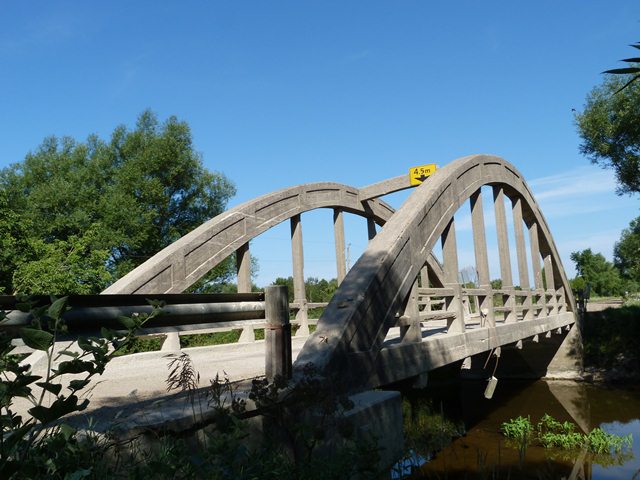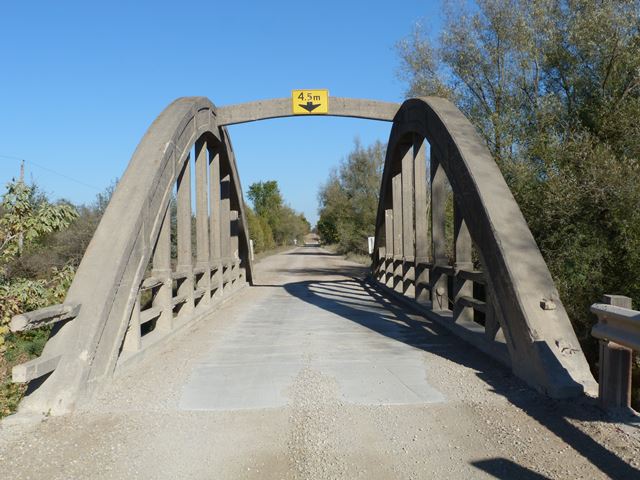We Recommend:
Bach Steel - Experts at historic truss bridge restoration.
BridgeHunter.com Phase 1 is released to the public! - Visit Now
Gibson Bridge
1st Line South Bridge

Primary Photographer(s): Nathan Holth and Rick McOmber
Bridge Documented: July 21, 2012 and September 27, 2015
Centre-Wellington: Wellington County, Ontario: Canada
1917 By Builder/Contractor: Charles Borromeo Mattaini of Fergus, Ontario
Not Available or Not Applicable
Not Available
79.7 Feet (24.3 Meters)
18 Feet (5.49 Meters)
1 Main Span(s)
Not Applicable

View Information About HSR Ratings
Bridge Documentation
This bridge's future is at risk!
Bridge Status: Slated for demolition and replacement in 2022!This is one of a rapidly disappearing example of a unique group of concrete bowstring through arch bridges, sometimes called "rainbow arch" bridges remaining in the township of Centre-Wellington. The bridge exhibits excellent historic integrity with no major alterations detected. There is a single overhead brace connecting the two arches on the bridge. This overhead brace has a notable arch to it, presumably to give additional clearance on the bridge, given that this arch is one of the shorter examples with overhead bracing.
While Ontario has a number of remaining such bridges in the province, for many years, Centre-Wellington has been noted for an especially large collection. However these bridges are being demolished at an alarming rate. Most alarming is a statement recorded in the March 29, 2011 minutes by the heritage committee. The following is an exact quotation:
Kathy gave an overview of the situation on bridges that are slated for replacement. She noted that there are 10 Bowstring bridges left in our township and that, according to Ken Elder, the main reason for replacing these bridges is to provide adequate access for farm machinery. Kathy further advised that the only one that they can consider saving is the one near Portage.
Discussion ensued regarding current standards for bridges and the cost to save vs. replacement. Dave noted the Eden Mills bridge replacement several years ago and suggested that they be approached to ask what safety standards etc. they used to construct a sympathetic replacement.
What do do? Possibly recommend designation and maintenance of one good example of this type of bridge such as the Irvine Street bridge. Don wondered whether there is any validity in closing some of these roads/bridges?
A plaque for replacement of each bridge was suggested and the committee agreed to pursue designation of the Irvine Street bridge.
What these minutes indicate is truly alarming. This is an official statement by Centre-Wellington that they plan to demolish nine of the ten bowstring bridges remaining in 2011, and only even consider saving a the one remaining example. In other words, not even an attempt to save nine of the bridges will be made, and the tenth bridge will be merely considered for preservation. Granted, it is true that not every heritage bridge everywhere can be saved. However, it seems reasonable to suggest that saving only one out of ten bridges, and even the one not for certain, is not showing the strongest commitment to heritage preservation. Many of these bridges are in highly rural locations. A study of each bridge should be conducted to evaluate preservation possibilities. These bridges have been sufficient for traffic in this area for decades. Have the traffic needs suddenly changed so drastically within the past year that suddenly 9/10 bridges need to be replaced? Could any of the bridges instead be rehabilitated for continued vehicular use. Nearby alternative crossings on parallel roads may provide an unrestricted crossing for vehicles for any height, width, and weight restrictions a rehabilitated bowstring might impose. Alternatively, some bridges might be able to be left in place either for pedestrians or closed to all traffic, with a new bridge constructed next to the heritage bridge. Many of these bridges are not located near any homes or other buildings, so there is room to have two bridges side by side without disrupting much.
Above: Bridge closed to traffic and seen in May 2019. Photo Credit: Caleb Barker.
This bridge is tagged with the following special condition(s): Unorganized Photos
![]()
Photo Galleries and Videos: Gibson Bridge
Bridge Photo-Documentation
Original / Full Size PhotosA collection of overview and detail photos. This gallery offers photos in the highest available resolution and file size in a touch-friendly popup viewer.
Alternatively, Browse Without Using Viewer
![]()
Bridge Photo-Documentation
Mobile Optimized PhotosA collection of overview and detail photos. This gallery features data-friendly, fast-loading photos in a touch-friendly popup viewer.
Alternatively, Browse Without Using Viewer
![]()
Additional Unorganized Photos
Original / Full Size PhotosA supplemental collection of photos that are from additional visit(s) to the bridge and have not been organized or captioned. This gallery offers photos in the highest available resolution and file size in a touch-friendly popup viewer.
Alternatively, Browse Without Using Viewer
![]()
Additional Unorganized Photos
Mobile Optimized PhotosA supplemental collection of photos that are from additional visit(s) to the bridge and have not been organized or captioned. This gallery features data-friendly, fast-loading photos in a touch-friendly popup viewer.
Alternatively, Browse Without Using Viewer
![]()
Northwestbound Crossing
Full Motion VideoStreaming video of the bridge. Also includes a higher quality downloadable video for greater clarity or offline viewing.
![]()
Southeastbound Crossing
Full Motion VideoStreaming video of the bridge. Also includes a higher quality downloadable video for greater clarity or offline viewing.
![]()
Maps and Links: Gibson Bridge
Coordinates (Latitude, Longitude):
Search For Additional Bridge Listings:
Additional Maps:
Google Streetview (If Available)
GeoHack (Additional Links and Coordinates)
Apple Maps (Via DuckDuckGo Search)
Apple Maps (Apple devices only)
Android: Open Location In Your Map or GPS App
Flickr Gallery (Find Nearby Photos)
Wikimedia Commons (Find Nearby Photos)
Directions Via Sygic For Android
Directions Via Sygic For iOS and Android Dolphin Browser




